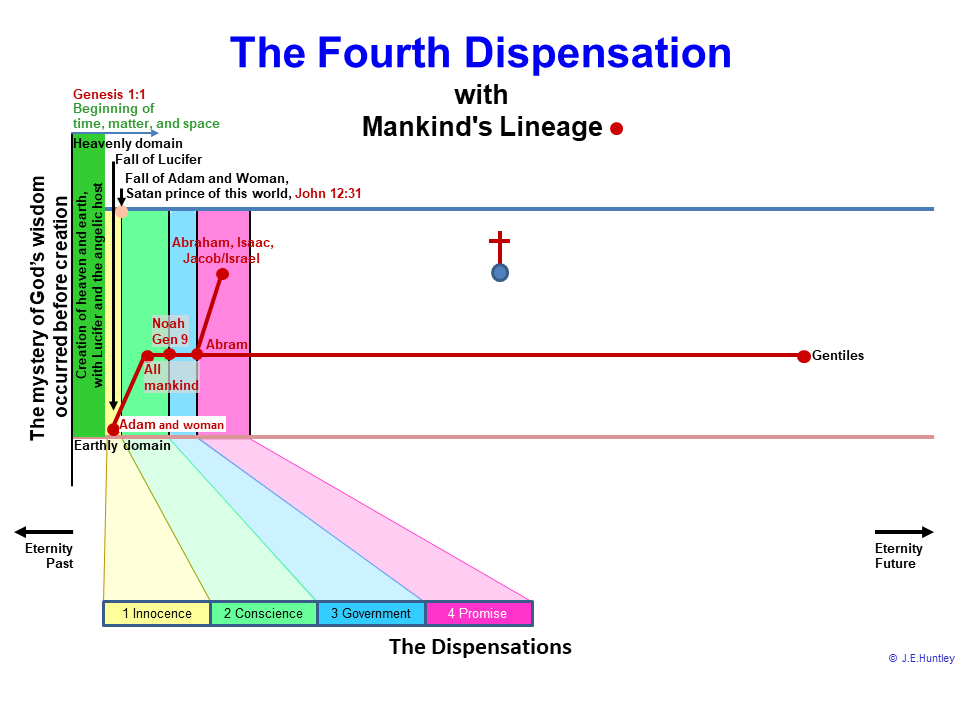Interpretations: Dispensation of promise
As mentioned in the description on the dispensation of government concerning the world’s population after the flood, how they quickly turned from obeying the Lord’s word of being fruitful, multiplying and replenishing the earth. Additionally, the early descendants of Noah coalesced into one place in defiance of God, seeking to build a high tower. Their efforts were in alignment with what Satan said when he fell. They desired to exalt themselves as gods, Isaiah 14:13-15. Despite the continued wickedness of mankind after the flood, the Lord appeared to Abram, calling on him to leave his country, family, and his father’s house to move to a new land God would show him, Genesis 12:1-4. Later, God appeared to Abram and told him that He brought him out of the Ur of the Chaldees to inherit the land of Canaan, Genesis 15:7. Once Abram finally acted as God directed, and separated himself from his last family member, Lot, Genesis 13:14-18, God met with Abram and imitated the dispensation of promise.
Identification of the party(ies) involved are Abram/Abraham and his natural seed, Israel (and all those who afterwards believe God in faith, Habakkuk 2:4):
- God separated from all humanity a man Abram, and his progeny for Himself, to reveal His glory and purpose to the world, Romans 3:1-2, Romans 4:1-10
The dispensational test was:
- To live by faith in God and in obedience to His Word, Genesis 15:6
- God’s revealing of Himself to Abram has two parts:
- As Abram’s shield, and
- Abram’s exceeding great reward, Genesis 15:1
- From that context God promised Abram an heir, Genesis 15:4
- He also showed Abram the stars, inferring that all who believed God in faith as Abram did, would be his spiritual seed, Genesis 15:5, Romans 4:3, Galatians 3:6 (the sand of the sea refers to Abraham’s physical descendants, Genesis 22:17)
- The descendants of Abraham through Isaac, was divided into the house of Jacob (the physical line) and the children of Israel (the believing remnant), Exodus 9:3, Isaiah 14:1
The dispensational failure was:
- Not walking in faith
- The children of Israel did not believe Moses when he told them that God said He would redeem them from Egypt, Exodus 6:6-9
- They refused to believe God and enter into the land He promised them, Numbers 14:6-38, Hebrews 3:7-19
- Without faith it is impossible to please God, Hebrews 11:6
- Yet, God will still show mercy to Israel, and raise her up in His kingdom because He will cause their failure to cease, Jerimiah 31:31-34
- Christ revealed himself the first time and was rejected, Isaiah 40
- The glory of the Lord will shine upon Israel and all the Gentiles will come to their light, and kings to brightness of Israel’s rising, Isaiah 60:1-5
The dispensational judgment was and will be:
- The nation of Israel will go through the great tribulation, Daniel 9:27, 12:1, Matthew 24:21-22
- The Lord will return in power, establish His kingdom and Israel will accept Him, Zechariah 13:6-9, Ezekiel 37:22-28
The following graphic illustrates the point when God separated unto Himself one man and his family, Abram and Sarai. He did this to reveal Himself through Abram and his seed after him. The Lord said that He called Israel in righteousness, He would hold their hand, keep them and give them as a covenant to the people, as a light to the Gentiles, Isaiah 42:6. Paul wrote about this separation of Abram and how God declared Abram as righteous, before he and the male members in his household were circumcised, Romans 3:28-31-4:1-12. This recorded event in history, how God interacted with Abram, provides the great exemplar of God’s grace extended to us, apart from the law, in this dispensation of grace we live in today.

